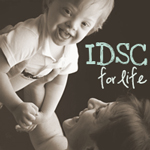Abortion: The perfect 'cure' for Down syndrome?
Posted: February 22, 2007
By Mark P. Mostert, Ph.D.
Dwight Core Jr. is 47, reported the Virginian Pilot Feb. 11. He likes to color using crayons from a Ziploc bag. Watching TV is fun, too. Dwight has Down syndrome.
"Think of Me First as a Person," a 7 1/2 minute home movie of his life, filmed by his father and collated by his nephew, has been the talk of the film festival circuit. It documents happy times, but also the heartbreak of Dwight's institutionalizatio
The Nazis called people like Dwight "useless eaters." The American College of Obstetricians and Gynecologists, or ACOG, calls them a disagreeable symptom of a less than perfect pregnancy.
Last month ACOG recommended that all pregnant women, regardless of their age, be offered screening for Down syndrome because improved diagnostics now more accurately detect Down syndrome earlier in pregnancy. Conveniently, this makes the option of choosing abortion easier. Or, as ACOG delicately puts it, screening allows OB-GYNs "to best meet the needs of their patients." Here, of course, getting rid of the mother's pregnancy is the "need" that has to be met.
The reality is that once a Down diagnosis is given, counseling of the parents is often biased against completing the pregnancy. Parents are much more likely to be told that a Down child will have a low quality of life or that he will require expensive medical care over his entire lifespan. A positive counterbalance is rare.
Essentially, ACOG's latest recommendation has taken a giant leap toward making the abortion of preborn children with Down syndrome socially acceptable, using the "it's for the best" excuse.
The tragic result? More of these children's lives are ended before they even draw their first breath than ever before.
Unborn Down children now are considered a medically negative symptom of pregnancy.
That's what we used to think of them decades ago: Imperfect beings with mental retardation and chronic medical problems that needed to be shut away because they were different. No school. Few, if any, friends. No real life to speak of.
Parents and other advocates have fought long and hard to have people with Down included in all aspects of society. Their efforts have meant increased tolerance and respect for the differences associated with the syndrome. Today, people with Down in the U.S. are arguably better served and included than ever before. Their increased public visibility has helped us all become more mindful of our common humanity.
Yet these humanitarian gains may be slipping from our grasp. Times have changed, and not for the better. If recommendations such as those of ACOG are followed, children with Down syndrome, in increasingly large numbers, will literally disappear – from our schools, our malls, our businesses, and our lives. In the oxymoronic world of "bioethics," this entire group of people would be denied the right to exist because they are unable to make the case for why they should even be born.
So, is ACOG really trying to rid the world of people with Down syndrome?
Undoubtedly.
In fact, we can safely say that they finally have found a perfect cure: Without exception, every case of Down syndrome can be cured by abortion. What better way to address the dreaded symptom of an imperfect pregnancy than to simply get rid of it?
This is exactly what ACOG's recommendation makes clear: This defect must be eradicated. Entirely. Killing as a preferred medical treatment. Killing for the greater good. What's not to like?
So, for an increasing number of Down children, their individual and group identity is being obliterated by the zealous over promotion of unblinking medical tests. The justification of whether they live or die is made for them – without their consent – by medical organizations like ACOG who've added a sophisticated insanity to the now-quirky notion of "Do no harm."
Mark P. Mostert, Ph.D., is director of the Institute for the Study of Disability and Bioethics at Regent University in Virginia Beach, Va., where he is also professor of special education.
---------
To find out more information on Dr. Mostert, see the link below:
Dr. Mostert's university home page. There are also links off of it to his new institute and a web project called, Useless Eaters.






















